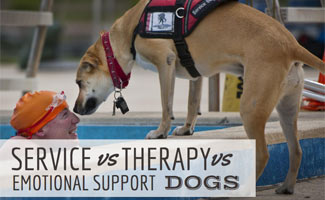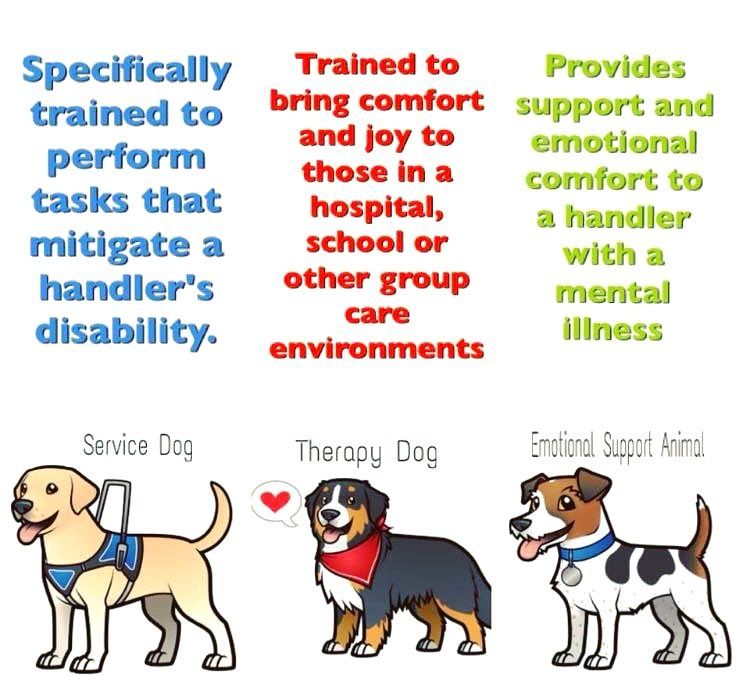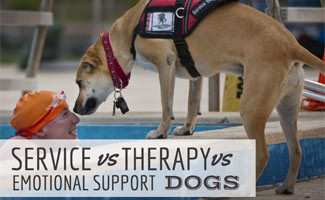Posted by Kimberly Alt for Canine Journal on Dec 18th 2018
Service Dog vs Therapy Dog vs Emotional Support Dogs

If you’re anything like me, you probably use the terms service dog, therapy dog and emotional support dog interchangeably. To be honest, until researching this article, I didn’t know there was a difference. However, these three types of dogs are used in completely different situations. To help clarify, we’ve written this article to explain where you may see a certain type and when someone may need one.
What’s the Difference Between Service, Therapy and Emotional Support Dogs?
A service dog is trained to help people with disabilities such as visual impairments, mental illnesses, seizure disorders, diabetes, etc. A therapy dog is trained to provide comfort and affection to people in hospice, disaster areas, retirement homes, hospitals, nursing homes, schools and more. Emotional support dogs provide their owners therapeutic benefits through companionship.
Service Dog Training
The option to use a service dog is given under the Americans with Disabilities Act (ADA) and local governments. According to the ADA, service animals are working animals, not pets. They have been specifically trained to perform tasks related to the disabled person’s specific disabilities. For example, if you are diabetic you may have a dog who can detect when your blood sugar level is too low or high. Training can be done by you, a friend, family member or professional trainer.
Service dogs must be on a leash, harnessed or tethered unless it interferes with the service animal’s work or the individual’s disability. Service dogs should be controllable and it is in the individual’s best interest if the dog knows verbal/hand signals such as sit, stay, come, down and heel. The service dog should also be house broken. Simply having a disability isn’t reason enough to categorize your own dog as a service dog. Your service dog must be able to complete tasks that you are unable to complete yourself.
Document Training
Be sure to document training dates and accomplishments in a notebook or online document. Not only will this help you through training, but it will also provide a paper trail for your service dog. Having a professional training certificate or video recording can offer validity if your service dog certification is challenged, but it is not required. If you have a psychiatric service dog, a doctor’s note may be required for airline travel and other public areas.
Service Dog Laws
There are two key service dog laws to keep in mind. First, service dogs have to be allowed into businesses and it is illegal for someone to ask about your disability. However, someone can ask if the pet is required due to a disability or what tasks your service dog is able to perform. Second, pretending to be disabled to gain access to an area is against the law. Service dog registration is not required by the ADA.
What Not to Do Around Service Dogs
Please do not pet service animals while they are working. The man in the video below has some more thoughts and tips based on his experience with a service animal.
What Do Therapy Dogs Do?
Therapy dogs are used in facilities to comfort people and give affection. Spending time with a therapy dog has been shown to lower blood pressure and heart rate, reduce anxiety and increase endorphins and oxytocin. Therapy dogs do not have to be trained to perform specific tasks like service dogs.
Therapy Dog Training
Are you asking yourself, “Can my dog be a therapy dog?” It’s important to first state that not all dogs are good candidates to be therapy dogs. Therapy dogs should be naturally calm as well as affectionate and friendly to strangers. They need to be obedient in addition to having regular wellness check-ups and also be well-groomed for each visit.
To train a dog to be a therapy dog, you may wish to do the following:
- Socialize your dog to new people, places and things
- Complete obedience training with commands like look and leave it in addition to teaching them to not jump on people and more
- Enroll your dog in a therapy dog class
- Register your dog with a national therapy dog organization
How to Certify a Therapy Dog
Depending on where you plan to take your therapy dog, you may not need to register him/her. Therapy dog certification can be achieved through various organizations but we recommend the AKC. To earn the AKC Therapy Dog title, you and your dog must do the following:
- Be certified by a therapy dog organization that is recognized by the AKC
- Perform the required number of visits:
- AKC Therapy Dog Distinguished (THDD) – 400 visits
- AKC Therapy Dog Excellent (THDX) – 200 visits
- AKC Therapy Dog Advanced (THDA) – 100 visits
- AKC Therapy Dog (THD) – 50 visits
- AKC Therapy Dog Novice (THDN) – 10 visits
- Dog must be registered with AKC (both purebred and mixed breed dogs are eligible)
Emotional Support Dogs
Emotional support dogs provide comfort, a calming presence and company. Emotional support dogs do not have access to all public areas, but there are two legal protections. First, they can fly with a person who has an emotional or psychological disability. Second, they can qualify for no-pet housing. A letter from a physician may be requested by housing authorities and airlines because the use of emotional support dogs has been abused by some over the years.
There is no formal training needed to be an emotional support dog, which is why you may see some that are not the most well-behaved. However, there are some characteristics you’ll want to know, so you have the best experience with your emotional support dog.
Characteristics to Look For
Your emotional support dog should be devoted to you and responsive to your emotions and commands. The dog should also be calm and laid back.A rambunctious dog has the capability of becoming an emotional support dog, but it will require more training.It is recommended to look for a dog that is around one year old so you can build that relationship with him and have him be out of his curious puppy phase. However, puppies can be emotional support animals as well; they’ll just need to be a breed that is people-oriented (e.g. Labrador retrievers, golden retrievers, Goldendoodle, poodle, etc.).
What Kind of Dog Is Needed?
We thought it’d be fun to “quiz” you to see if you can distinguish which type of dog is appropriate for various scenarios. Test your knowledge below.
Q: What kind of dog helps a person when they experience social anxiety while flying?
A: Emotional support dog or Service Dog (depending on task if any)
Q: What kind of dog is needed at school to help children experiencing anxiety?
A: Therapy dog
Q: What kind of dog is needed to pull a wheelchair?
A: Service dog
Q: What kind of dog offers companionship in day-to-day activities for one person?
A: Emotional support dog
Q: What kind of dog is needed to protect someone who is having a seizure?
A: Service dog
Q: What kind of dog is needed to remind a person with mental illness to take their prescription?
A: Service dog
Q: What dog helps a person with autism?
A: Service dog
Q: What kind of dog works with numerous people?
A: Therapy dog
Q: What kind of dog calms a person with Post Traumatic Stress Disorder?
A: Service dog or Emotional Support Dog (depending on task if any)


